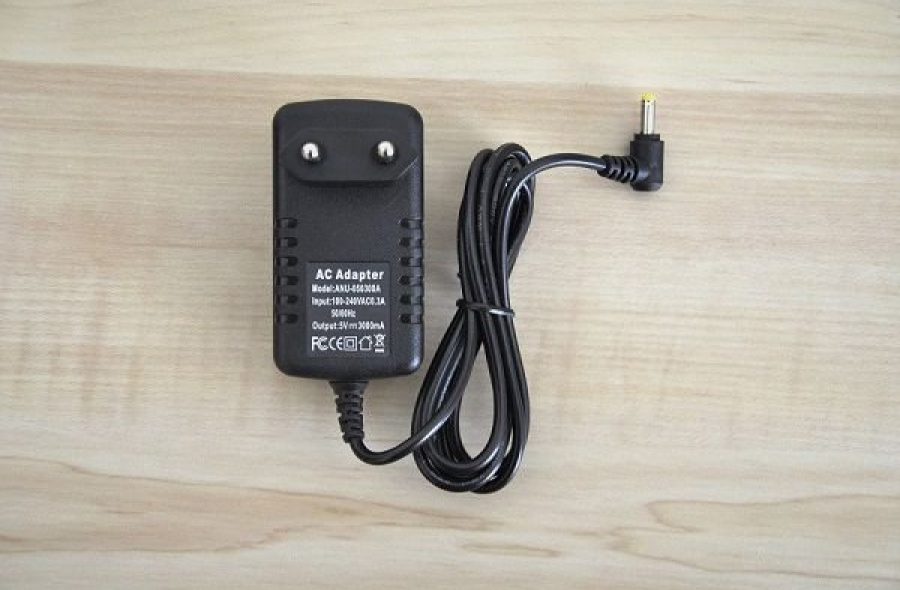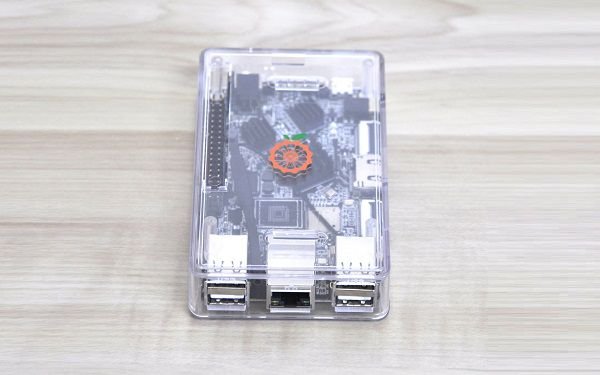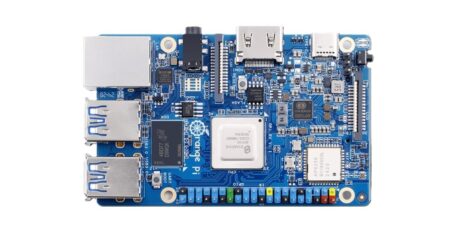Orange Pi Win Plus
Orange Pi Win Plus is a Development Board and a single board computer based on the Allwinner A64 SoC, a successor of the previous Orange Pi Win with a few changes in the specification such as 2GB DDR3 RAM, External battery connector, and 2Mb Spi Flash. This new SoC offers an improved 64-bit quad-core predecessor with above decent performance for the Buck, along with a wide selection of interfaces for developers and hobbyists, such as LCD, HDMI, CSI, 40 Pins Header, Gigabit Ethernet LAN port, Four USB 2.0 Hosts, on-board WiFi with Bluetooth and more.
If you are planning to build a low-cost NAS Device or workstation running Ubuntu or Debian OS, then this board mighty is a good and cheap solution for both DIY projects including product development. That said, for further information and price you are welcome to check Orange Pi’s official website and Aliexpress store.
Orange Pi Win Plus Development Board | Front

Orange Pi Win Plus Development Board | Rear

Orange Pi Win Plus Specification
| CPU | H3 Quad-core Cortex-A7 H.265/HEVC 4K |
| GPU | Mali400MP2 GPU @600MHz Supports OpenGL ES 2.0 |
| Memory (SDRAM) | 1GB DDR3 (shared with GPU) |
| On-board Storage | TF card (Max. 64GB) / MMC card slot, up to 2T on 2.5 SATA disk 8GB EMMC Flash |
| Onboard Network | 10/100/1000M Ethernet RJ45 |
| On-board WiFi | Realtek RTL8189ETV, IEEE 802.11 b/g/n |
| Video-Input |
|
| Audio Input | MIC |
| Video Outputs |
|
| Audio Output | 3.5 mm Jack and HDMI |
| Power Source | DC input can supply power, but USB OTG input doesn’t supply power |
| USB 2.0 Ports | Four USB 2.0 HOST, one USB 2.0 OTG |
| Buttons | Power Button(SW4), Recovery Button(SW2), Uboot Button (SW3) |
| Low-level peripherals | 40 Pins Header, compatible with Raspberry Pi B+ |
| GPIO(1×3) pin | UART, ground. |
| LED | Power led & Status led |
| Other | IR input |
| Supported OS | Android, Ubuntu, Debian, Armbian |
Package
Orange Pi Win Plus Board | Unboxing

Package Content
- x1 One-page quick guide
- x1 WiFi Antenna (Wire type)
- x1 orange pi win plus board

A Closer Look at the Orange Pi Zero Plus2
Accessories
Additional Accessories are not included with the orange pi win plus board. If you are planning on buying the transparent case, It highly recommends buying a decent heat sink for the A64 Chip with dimensions of 14×14 mm (Max). In addition, to ensure decent cooling, It’s also very recommended to buy a thermal pad for the pair of memory chips and apply them all with a sticky adhesive thermal paste.
Orange Pi Win Plus | Optional Accessories
Case Design: Cons & Pros
Although the case design was overall good with access to all interfaces, and the board package includes a simple wire-type antenna that worked pretty well inside the closed case, The case height should have been designed higher for a few reasons. For start, I was missing a hole for mounting an external WiFi antenna, and also the bottom cover was designed in such a way there wasn’t any extra space for adding thermal pads on both memory chips.
Orange Pi Zero Plus2 Inside Case
Software Support
In the software support arena, the Pi Win Plus board currently supports the following main operating systems/ distributions:
- Armbian
- Android 6.0
- Debian Jessie
- Raspbian
- Ubuntu
- DietPi
Personal Impression
After playing with a few of the images in the above list. The Android 6.0 image had a few major problems. Audio through the HDMI port didn’t work, the keyboard also didn’t work and the image didn’t come pre-installed with the google play store. The WiFi function didn’t work within the Ubuntu image didn’t That said, the Debian Jessie image did work pretty well, and WiFi and Ethernet performance were good.
If you want to use this board as a “lightweight” Mini PC to surf the web, check emails and use LibreOffice suite then it will provide above decent performance, especially if you place heatsinks on all chips for optimal cooling. After talking to Xunlong company I was told that they will fix the Ubuntu and Android images, but couldn’t commit to a specific time frame when this issue will be resolved.
Debian Jessie | Xfce Desktop


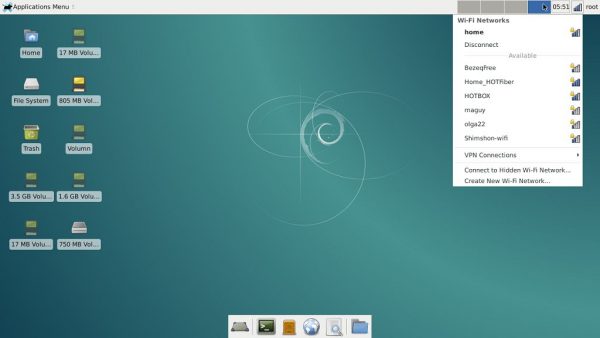
Ubuntu | Xfce Desktop

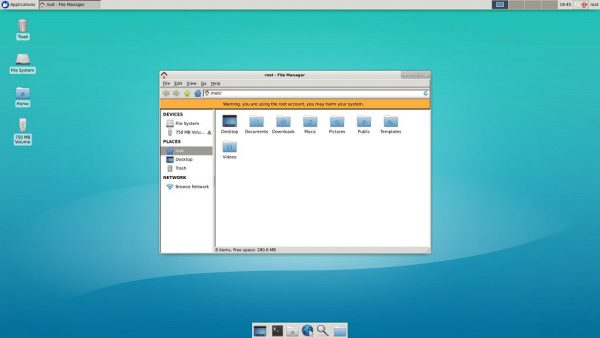
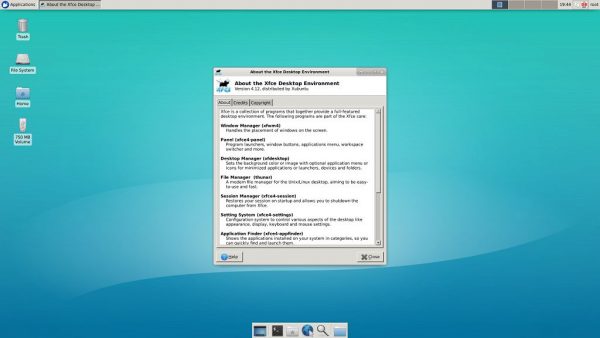
Power, CPU Information, Stress Test, Temperature, Memory
Power
Depending on what apps are running in the background, with two occupied USB ports occupied for the wireless keyboard and mouse the mode power consumption in idle mode with very light usage (Idle mode) ranged approximately between 4-5W. In more moderate usage Consumption jumped between 6.0-6.4W.
CPU Information
orangepi@Orangepi:~$ cat /proc/cpuinfo Processor : AArch64 Processor rev 4 (aarch64) processor : 0 processor : 1 processor : 2 processor : 3 Features : fp asimd aes pmull sha1 sha2 crc32 CPU implementer : 0x41 CPU architecture: AArch64 CPU variant : 0x0 CPU part : 0xd03 CPU revision : 4 Hardware : sun50iw1p1
CPU Benchmark (Stress Test)
Test #1 – Consumption in Watts:
- Number of threads Tested: 4, 20, 50
- Before Test: 4.1-4.2W
- During Test: 6-6.4W (Max)
$ sysbench --num-threads=4 --test=cpu --cpu-max-prime=100000 run
sysbench 0.4.12: multi-threaded system evaluation benchmark
Running the test with following options:
Number of threads: 4
Doing CPU performance benchmark
Threads started!
Done.
Maximum prime number checked in CPU test: 100000
Test execution summary:
total time: 68.9532s
total number of events: 10000
total time taken by event execution: 275.7560
per-request statistics:
min: 27.44ms
avg: 27.58ms
max: 33.01ms
approx. 95 percentile: 27.92ms
Threads fairness:
events (avg/stddev): 2500.0000/11.16
execution time (avg/stddev): 68.9390/0.01
Temperature
In the plastic case provided by Xunlong temperature measured was 53C. This temperature was measured in low system usage with Ubuntu Desktop Xenial without running any high apps.
$ cat /sys/devices/virtual/thermal/thermal_zone0/temp 53
Memory Usage
Because Xfce is a very lightweight desktop environment, Memory and system resource consumption were relatively very low. Without loading any applications in the background. From a total of 2GB RAM, the OS utilized 308Mb I was left with 1.6G of free RAM.
Memory Benchmark
$ sysbench --test=memory --memory-block-size=1M --memory-total-size=2G run
sysbench 0.4.12: multi-threaded system evaluation benchmark
Running the test with following options:
Number of threads: 1
Doing memory operations speed test
Memory block size: 1024K
Memory transfer size: 2048M
Memory operations type: write
Memory scope type: global
Threads started!
Done.
Operations performed: 2048 ( 2162.62 ops/sec)
2048.00 MB transferred (2162.62 MB/sec)
Test execution summary:
total time: 0.9470s
total number of events: 2048
total time taken by event execution: 0.9455
per-request statistics:
min: 0.46ms
avg: 0.46ms
max: 0.63ms
approx. 95 percentile: 0.50ms
Threads fairness:
events (avg/stddev): 2048.0000/0.00
Memory usage (Ubuntu Desktop Xenial):
orangepi@Orangepi:~$ free -h
total used free shared buffers cached
Mem: 1.9G 308M 1.6G 10M 18M 125M
-/+ buffers/cache: 163M 1.8G
Swap: 0B 0B 0B
Final Words
Although I didn’t test all images this board supports, I have mixed feelings regarding Android and Ubuntu images that had problems. If you are looking for a cheap board to run Debian and other distributions such as Armbian, then this board will do it well.
Pros / Cons
Pros
- 2GB RAM
- Fast Ethernet
- Good performance
Cons
- No eMMC
- Some images have issues.






















